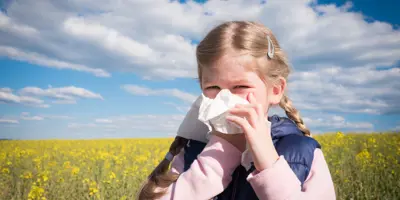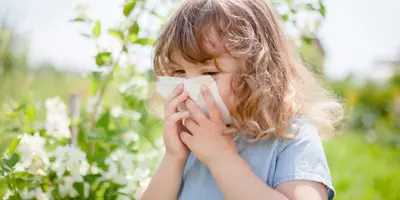4 people found this helpful

When the sun is shining and you get a runny nose, watery eyes, and itchy throat, all the signs point to hay fever rather than a cold. While there are similarities between hay fever symptoms and cold symptoms, an allergy to pollen creates these reactions because the immune system is battling the allergen – rather than an infection. Learn more about the signs of hay fever here.
Main hay fever symptoms
Although no two people experience exactly the same symptoms, the typical signs of hay fever can include the following:
- Red eyes
- Tickly cough
- Itchy throat
- Runny nose/sneezing
- Skin rash.
Whatever causes your hay fever, keep Cushelle Pocket Pack Tissues with you. They’re gentle on your skin for frequent nose wiping and blowing, while being strong enough to hold all that mucus.
The main difference between cold and hay fever symptoms is that with hay fever they occur all at once, rather than building up slowly. With hay fever, they also last as long as the allergen is present – with a cold, the symptoms usually clear up in one or two weeks. Let’s take a look at each of the signs of hay fever in more detail.
Red hay fever eyes
Eyes are often affected by hay fever, and that’s because pollen can land directly on the thin membrane that covers the eye. The eye reacts by producing tears to wash the allergen away, and the irritation leads to sore, itchy and red hay fever eyes.
Tickly hay fever cough
Hay fever can make you cough when pollen irritates the lining of your nose and causes the nasal passages to produce watery mucus. When this slides down the back of your throat you naturally try to cough it up.
You can tell that you have a hay fever cough rather than a cough that’s caused by a cold by checking the colour and consistency of any mucus you’re coughing up. It’s typically clear and watery when caused by hay fever, and thick and yellow/green with a cold infection.
Itchy hay fever throat
It’s common to get an itchy throat with hay fever. That’s because the pollen irritates the whole upper respiratory tract. But rather than the throat feeling sore (like it typically does with a cold), a hay fever throat is more commonly described as tickly or itchy. You might feel this in your mouth, ears, and nose, too.
Runny nose and sneezing
Just as the throat can be affected by pollen in an allergic reaction, so can the nose. The irritation can trigger the production of mucus, in an attempt to clear out the allergen. Cue lots of sneezing and nose blowing!
Hay fever rash
It is possible to get a skin reaction with hay fever. Rash reactions tend to last just for a few days, and occur each time you’re exposed to the allergen. You can tell the difference between this kind of rash and others by how long you have them and how often you get them. Long-lasting skin rash reactions, like scaly skin, are more likely the result of a food allergy. A one-off rash is more likely the result of a virus infection.
With this information about the signs of hay fever you can feel confident in figuring out what you’re suffering from. Now you understand the different causes of similar symptoms, you’ll be well equipped to work out how best to help your body get better.
Related articles
The truth behind hay fever causes: hay fever myths debunked
What causes hay fever? We debunk the myths surrounding hay fever triggers and answer common questions like is hay fever contagious? Find the answers here.

5 natural and herbal remedies for hay fever to try at home
Want to know how to treat a pollen allergy at home? Discover five options, from herbal teas and steaming to herbal remedies for hay fever relief, here.

A guide to cross-reactivity allergy issues
Are you looking for info about cross-reactivity? Oral allergy syndrome? Latex-fruit syndrome? Discover the facts, and what you can do about it, here.

Sports & pollen allergies 101: tackle a runny nose when running
Learn what to do about exercise-induced rhinitis. With our top tips you’ll be able to keep running with hay fever and limit sneezing after exercise.

Pollen allergies: symptoms & diagnosis
Discover common grass and tree pollen allergy symptoms. Find information on what happens in a pollen allergy test, and how to get a hay fever diagnosis, here.

Pollen allergy in children: How to cope with kids’ hay fever
The symptoms of pollen allergy in children can be tackled. Click here for tips on how to treat hay fever in children.



